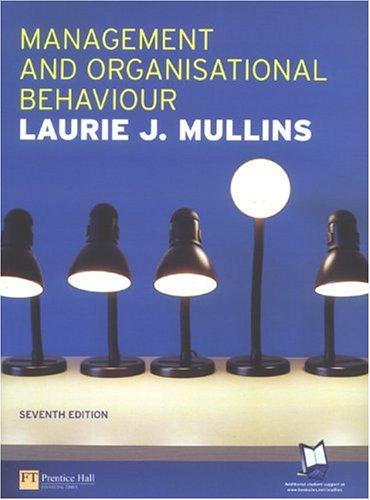This small district authority was to undergo considerable change in its direction, culture and management style. Central
Question:
This small district authority was to undergo considerable change in its direction, culture and management style. Central government had reduced its financial balances and had sought to control the authority through various departmental guidelines and regulations.
Politically, the local election had seen a swing in voting patterns from the previous Labour authority to a Tory administration. The new administration had a very different political manifesto and agenda for the council. Politicians saw there being much more involvement of the private sector with the county council taking an 'enabling role' rather than continuing to be the sole or direct provider.
The Chief Executive Officer, John Hoames, was charged with the task of implementing some of the changes and told to do so quickly - within the following year. He had decided to use management consultants to help in the process but was considerably anxious about the nature of the task and often said so when not in the company of his other managers.
The Strategic Management Group (SMG) meeting was about to start. Its members included the top team and their direct lines. The meeting was a regular monthly event and its declared aim was to be the body of the organisation to implement strategic decisions. The group numbered 15 in total.
John: Well, the next item on the agenda concerns our change management directive. This item has been on the table before. Various members of this group were involved in the brief and final selection of the consultants, who are here today to go through their proposal.
Jane (the consultant): Thank you, John. We are very pleased to be working with you on this proposal and I'd like to go through the key phases of the work.
(Jane and her other two male colleagues go on to describe the main phases of the work. This included process consultation, workshops and an intergroup event of the top team and their managers. After a formal presentation of overhead slides the group is invited to ask questions.)
Jerry (Assistant Director of Social Services): I thought the main idea of the consultancy was to provide us with information on management style. I did not think to look at the whole organisation.
(There are murmurs of agreement.)
Griff (Assistant Director of Human Resources): Yes. I saw it as a training and skills workshop so that we could improve our interpersonal communication.
Harry (Head of Finance and Corporate Services): I still do not see exactly what we hope this will do. We will need to justify what we are doing to elected members and staff, especially given the cuts in other areas of our work.
Gary (Assistant Director - Contract Services): I don't see why there is so much concern. We already have undergone competitive tendering in the manual areas of our services such as leisure and refuse collection.
And now we need to think about 'white-collar' services and this programme will enable us to do it.
Jennifer (Director: Planning and Environmental Services):
Well, I think it's really about how we work as a team.
We never seem to make decisions, we're rarely sure about the agenda, our communication is something to be desired and I feel we're re-creating the same cycles that we go through in every meeting.
John: I really do not understand! We all saw the brief, agreed the selection of the consultants and now we seem to be backing off.
Questions
Discuss what you see as the main issues and questions arising from this case.
Step by Step Answer:






